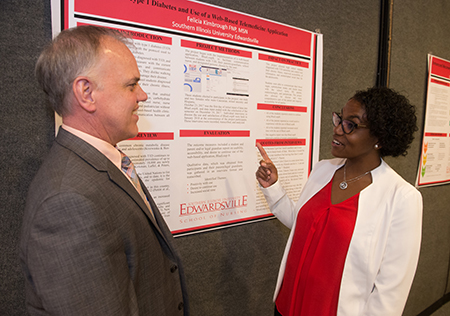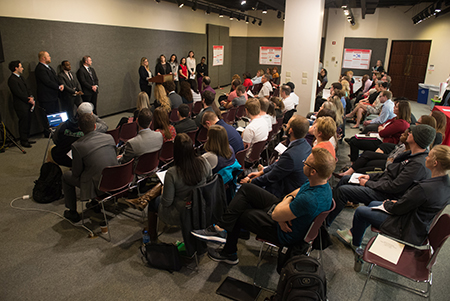 The Southern Illinois University Edwardsville Graduate School and School of Nursing (SON) celebrated the graduation of nearly 45 doctoral students on Friday, May 4. The healthcare professionals completed the University’s Doctor of Nursing Practice (DNP) program with specializations in nurse anesthesia, family nurse practitioner or post-master’s.
The Southern Illinois University Edwardsville Graduate School and School of Nursing (SON) celebrated the graduation of nearly 45 doctoral students on Friday, May 4. The healthcare professionals completed the University’s Doctor of Nursing Practice (DNP) program with specializations in nurse anesthesia, family nurse practitioner or post-master’s.
Just before graduating, the doctoral candidates presented their final practice projects on campus to a crowd of students, faculty, administrators, healthcare professionals and community members. Their projects all involved the analysis of a healthcare issue and, with strong research support, proposed a viable solution they will take with them to affect change during their professional careers.
“With the explosive growth we’ve experienced in our DNP program, this year we decided traditional podium presentations were no longer a conducive approach for sharing these innovative projects,” explained Andrew Griffin, PhD, SON assistant dean for graduate programs. “Instead, we held sessions which consisted of an informal poster presentation, followed by a more formal 30-minute moderated question and answer segment. The exciting, engaged presentation atmosphere left students feeling empowered after having shared details specific to audience interest.”
“This innovative presentation strategy positively showcased our students’ high-quality DNP practice projects that will certainly make a significant impact on healthcare delivery,” said SON Dean Laura Bernaix, PhD, RN.
Projects addressed issues including, but not limited to healthcare policy, communication and access. A prominent theme involved the use of technology to more effectively communicate with healthcare peers and patients.
“My project focused on the implementation of a web-based application, named BlueLoop, to communicate with Type I diabetics within a moderately sized high school in southern Illinois,” said Felicia Kimbrough, a nurse practitioner who pursued a post-master’s DNP.
In her work as a nurse practitioner, Kimbrough recognized a need for high school students with Type I diabetes to communicate their health updates via electronic devices, since they were complaining about missing social time and interaction with peers when reporting their medical information at the clinic each day.
“We used the app to share information regarding menu selections and the carbohydrate counts of the food items, and then the students were able to enter their blood sugar, how many carbs they were going to consume and how much insulin they took,” Kimbrough explained. “That information was shared with the high school’s health center including the school nurse and the nurse practitioner. It was also shared with the student’s parent and anyone else they selected to receive the information.”
“Especially when working with the adolescent population that has always had access to cell phones and other technological devices,” she continued. “We as nurses and healthcare providers must adapt to meet their communication needs.”
 Nurse Anesthesia DNP students Scott Kahre and Jared Holton also created a policy application called the Advocate Platform.
Nurse Anesthesia DNP students Scott Kahre and Jared Holton also created a policy application called the Advocate Platform.
“Our project addressed the gap in advocacy for nursing, specifically for nurse anesthetists, but also generalizable to all advanced practice nurses,” said Kahre. “There is a huge disparity of leverage with nurses and the legislative process which influences how healthcare I accessed, what’s available, associated costs and scope of practice.”
According to its creators, Advocate Platform is a political resource tool that offers practitioners concise explanations of where their authority to practices comes from, who is in charge of maintaining policy changes and a synopsis of how policy has changed through history. It serves as a rolodex providing legislative contact information for healthcare professionals to access and use for advocacy.
“Scott and I both have a passion for not only our profession, but also for lobbying for patients and improving their care,” Holton explained. “Through this app, we are able to advance patient care at a cost-effective rate and promote our profession.”
This type of practice-oriented research and project implementation, along with the SIUE School of Nursing’s broad clinical opportunities, are what drew these innovative students to the DNP program.
“There are three anesthesia programs in St. Louis, and SIUE by far has the broadest clinical experience to offer students,” Kahre said. “Now, having been to many rural areas, independent CRNA practices and part of major tier hospitals, I have a more universal, global understanding of not only variance, but also how they feed into a collective system.”
For more information on the SIUE School of Nursing’s graduate programs, visit siue.edu/nursing/academic-programs/graduate/index.
Photos: SIUE School of Nursing DNP program graduate Felicia Kimbrough presents her practice project to Assistant Dean for Graduate Programs Andrew Griffin.
Doctoral candidates in the SIUE School of Nursing presented their practice projects prior to their May 4 graduation.